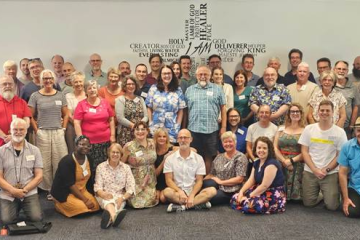We have just begun a series based on Sarah Bessey’s, Field Notes for the Wilderness, a book which explores some of the practices that may sustain us in the journey of faith. And in chapter 5, the practice Bessey speaks about is “cultivating hope on purpose” (which after the week of world news we’ve had might feel like a hopeless cause), but one which we are encouraged, in our Bible readings this morning, to pursue.
Bessey begins this chapter by naming some of the reasons we may have lost hope, and she quotes the proverb (I was tempted to test you again – is it the Bible or Shakespeare?); “Hope deferred makes the heart sick, but a desire fulfilled is a tree of life,” and reading that, an image came to mind from the beautiful Advent reflections people wrote last year. (They were amazing, weren’t they? We don’t often do this, but I think they deserve an Amen! Amen? Amen!) It was Linda Lyle’s reflection on hope, speaking about her tree fern. She wrote:
“My tree fern is dead. Well – there’s a fair chance it could be. I hadn’t been out in its part of the yard for a while and wow I got a shock last week when I wandered over! Fronds all brown and dead. No signs of life. If you are a gardener, you can imagine my horror and distress (and you are also probably rousing on me for my neglect).”
And what Bessey describes are the different ways that many of us have had this moment, in different situations, of feeling that our hope has died; or at least that it is heartsick and dying, that its “fonds [are] all brown and dead, [with] no signs of life.”
Perhaps, she says, “we had hoped that the people who introduced us to Jesus wouldn’t be deceived by Christian nationalism or conspiracy theories.
We had hoped our marriages would survive….
We had hoped if we raised our kids a certain way we could guarantee a particular outcome.
We had hoped our prayers would be answered in that ICU in Nashville (or in Sydney or Campbelltown or Canberra).
We had hoped we could bring our whole selves to church.
We had hoped the Gospel would be good news and glad tidings for everyone.
We had hoped for justice.
[We had hoped that the Association we are part of would have the depth of Baptist heritage, the strength of Baptist fellowship, the grace of Baptist grace to allow difference, to allow diversity, within the body of Christ – that one, clearly, I added!]
We had hoped for many things.”
We are like the psalmist, facing the questions from without and from within, “Where is God in all of this?” Why hasn’t the Jesus that I put my faith in, that I prayed to, that I trusted delivered…delivered me?”
Sometimes, Bessey writes, “its worthy and good work to interrogate our expectations of Jesus. Sometimes we’re like the disciples, who expected one type of Messiah and got the crucified Lamb of God instead. Sometimes our expectations need to be disappointed [to] make room for the true, the wise, and the good realities of God.”
And sometimes, I believe, there is nothing wrong with our expectations of Jesus; but somehow our heartsickness, described by the psalmist, our sense that God has forgotten us, has to sit side by side with the knowledge God is always with us. The Psalmist who says (Psalm 42 again) “I say to God, my rock: ‘Why have you forgotten me?’” also says in the verse immediately before, “By day the Lord commands his steadfast love, and at night his song is with me.” Sometimes we have to sit with the heartsickness while we wait and work for another kind of hope to grow.
Because the fact that you are on the road of faith at all is a sign that you have dared – not to hope against hope – but to hope for hope.
You, Bessey says, are here because, “you dared to hope the Gospel was true.
You dared to hope that Jesus meant what he said and God is love.
You dared to believe that the Church could be a sanctuary for the wounded and the misfits and the marginalised.
You dared to hope that we are all made in the image of God.
You dared to hope prayer changes things….
You dared to hope that Jesus’ teachings and way of life would matter more than politics or power, that truth and goodness matter.
You dared to hope for friendship, justice, and belonging, for shalom.
You dared to hope for peace.”
And so, you continue to hope.
Coming back to Linda’s Advent reflection, she writes, “I have leapt into action – daily soaking [the tree fern] with the hose, shade cloth draped over the gum tree above it to shield it from the intense heat…hoping that I have intervened in time.
Each day I gently probe the top of the trunk into the strange furry crown with my finger, looking for a sign of hope, a sign of life. The anticipation, the willing and hoping that there might be a new little fiddle down in there – and today – today I can feel not one, but 3 little coils! I’m not resting on my laurels yet, but I’m hopeful!
And then she wrote this, “That’s how I find that hope works, by continually moving forward and searching for God’s presence in the good signs. And that’s not always easy.”
Continually moving forward, hoping for hope, is not always easy, but as Paul writes in Romans 5, we begin this journey of hope with a life-changing, game-changing advantage. We begin knowing that God is with us, “that we have peace with God through our Lord Jesus Christ”, that we are standing on the most solid of foundations, even when “all other ground”, as the old hymn says, “is sinking sand”. We set out on the journey of hope with God beside us.
And Paul wants his readers to know that the setbacks and the hardships they experience are not because they are on the wrong path. We can “boast in our hope of sharing in the glory of God,” he writes, “and not only that, but we also boast in our sufferings.” One of the characteristics, here in Romans and identified by psychologists,
is that people who hope for hope know their path will be marked by stresses, roadblocks and failure, but they are able to adapt, and they keep going. People of hope persist.
Hope is both what keeps us going and our end goal. “Suffering,” Paul writes, “produces endurance, and endurance produces character, and character produces hope, and hope does not disappoint us, because” as Paul reminded us at the beginning, “God’s love has been poured into our hearts through the Holy Spirit that has been given to us.”
The beginning of our journey is God’s love and the end of our journey is God’s love and God’s love sustains us on the way. And the beginning of our journey is hope and the end of our journey is hope and that hope will not disappoint us on the way.
“Your hope,” Bessey writes, “turns over tables in the Temple. Your hope is how you vote and march and protest, and as the wise Reverend John Lewis said, “Make good trouble, [necessary trouble]”. Your hope shows up for the lovely, the needy, the sick, the stranger. Your hope sings songs and sets another plate at the…table… Your hope is planting gardens in the very place of your exile.”
And this is what our hope will do here at Canberra Baptist despite the challenges that come, despite the friends – who to quote another old hymn “despise or forsake us” – our hope will hold that door wide open for anyone who loves Jesus, our hope will believe that the Good News is for all people without qualification, our hope will care those who sit beside us in the pews or at our small group or at work or at school or the doctor’s surgery, our hope will spend time with young families or do yoga or craft with neighbours, or grow things in our garden, or cook with people with all kinds of disabilities or clean the community centre so it is ready to welcome all these people, our hope will overflow in generous giving, our hope will keep attending Palm Sunday rallies and rallying behind Aboriginal and Torres Strait Islander Christian leaders, our hope will be heard in our singing and praying and conversations and laughter, our hope will keep working and waiting and hoping for signs of new life.
I checked with Linda during the week for a status report on the tree fern – just to check if it was still a viable metaphor for hope, and she sent through this!
“Hope deferred makes the heart sick, but a desire fulfilled is a tree of life.” In this case a tree fern full of life! “Revelations tells us about that tree of life,” Bessey concludes, “that its leaves are for the healing of the nations and the renewal of all things.” This is where our hope is heading. This is why we wait and work for hope. This is what we hope for knowing that our hope is in Christ who is with us all the way.


